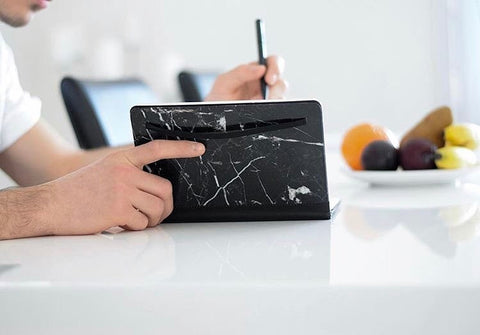- Home
- Shop
- Living
- Blog
- MIKOLITE
- SinterTech
- About
- Gallery
- Sign in
July 10, 2020

People may think notebook journals are becoming outdated/obsolete and we perform all our note-taking on a laptop, iPad or iPhone. This is true to some point. But there are many benefits to keeping a journal that you can enjoy, so don't be too quick to dismiss keeping a few notebooks around.
Many influential people in history and now still keep detailed journals in their lives. Digital notes often can be mistakenly deleted on your phone, sometimes it may crash, or be hacked. Having hard copies still, presents a certain emotional connection digital notes can’t compare to.
Even if you don't think there'll ever be a documentary that uses your journal for flavor commentary, there are plenty of reasons to keep one for yourself. Like a nice timepiece, it could be passed down to your children that tell your story and what accomplishments you've made.
Jotting down notes in a hardcover notebook can help you harness creativity along with relaxation therapy. Whatever it is, these are all great reasons. Let's look at each one, and why they matter so much.
Journaling regularly has enormous health benefits. Building a habit of writing can give you a safe, cathartic release valve for the stresses of your daily life. We've discussed some of those mental and emotional benefits of writing before, from the angle of creative writing.
Keeping an awesomeness journal can do wonders for your self-esteem. Regular writing makes you feel good and allows you to re-live events you experienced in a safe environment where you can process them without fear or stress.
This study from the journal Advances in Psychiatric Treatment is a great experiment and summary of how counselors, social workers, and therapists often use writing exercises to help patients deal with traumatic, stressful or emotional events. It's as simple as 15~20 minutes on 3 ~ 5 occasions was enough to help these patients.
In fact, this practice is so regarded that there's a Center for Journal Therapy dedicated to the mental health benefits of regular journaling, both in therapeutic and personal settings.
There is even a journaling feature in the BetterHelp app that has been proven to be effective in aiding those in therapy.
In short, it's about how you write, about how you tell your personal story.
Keeping a work diary can serve as a track record of mistakes and successes. Having a written record of yourself can come in handing in understanding who you are. You can learn about mistakes/flaw that you don't notice. Other people may comment about you that you didn't realize. These handwritten journals you can look back and verify if this is a consistent trait. Keeping a journal is a great way to build better habits, as it forces you to be aware of your actions and behaviors.
Another great exercise is to simply write down your daily positive thoughts. Or write down one area you are appreciative every day. Over time, this brings more positivity to you as a person and improves your outlook on life as well, even during down times.
The best way to get better at writing is to keep practicing. Regular writing can help you learn to process and communicate complex ideas effectively. It can also help you memorize important information, and brainstorm new ideas. Writing down your experiences and ideas allows your brain to take a break and evaluate more information at once, seeing opportunities that may not have been apparent at first.
Plus, it's always nice to just have something on hand to showcase your style. The magic in writing is YOU. It's a personal signature in your story that digital just can't replicate yet.
Comments will be approved before showing up.
